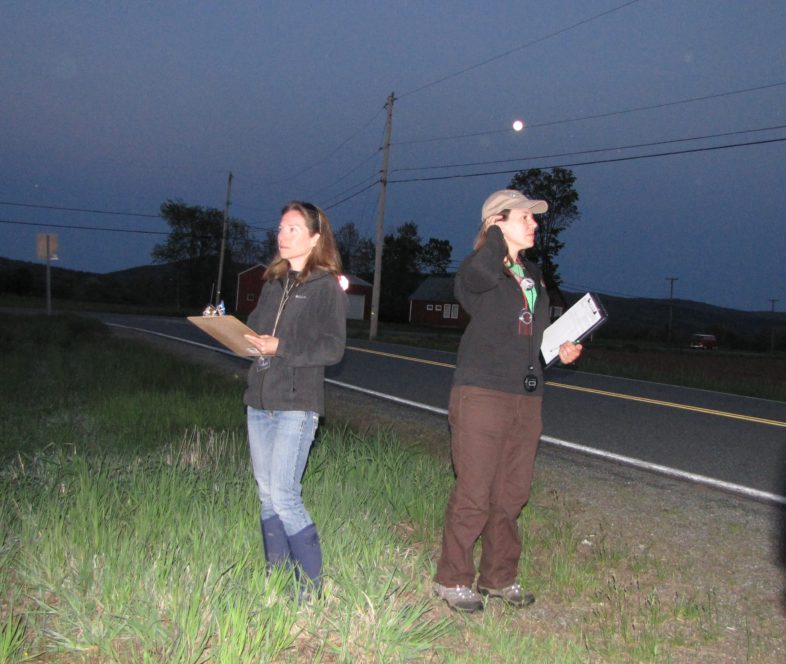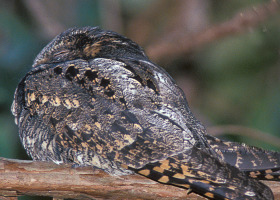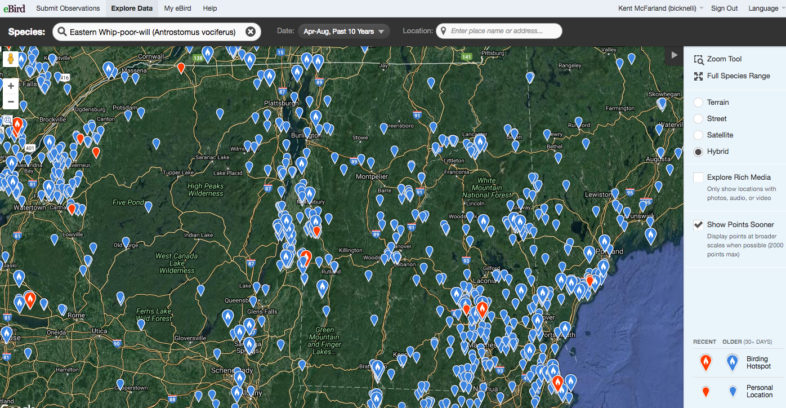
Looking for something fun to do this spring and summer? Why not try night birding! Do you have an hour or so to spare for Eastern Whip-poor-wills in May or June? For years, some of our courageous volunteers have surveyed Whip-poor-will routes across Vermont on moonlit nights, but we need a few more adventuresome volunteers.
Four roadside routes have yet to be claimed – Hartland, Panton, Shoreham and Rockingham. This is a great opportunity to help out with a regional conservation project. If you are interested in learning more about our survey, please contact Sarah Carline at for more information about this joint project with Vermont Fish & Wildlife.
 During spring and summer nights, the relentless chanting – whip-poor-will! whip-poor-will! – carries over mountains and across valleys. The eerie mantra of the Eastern Whip-poor-will was once heard throughout the Northeast, its unmistakable call a welcome harbinger of spring. But over the past several decades, as grasslands and shrublands revert back to forest or are developed, the former haunts of this aerial insectivore have grown quiet, and the Eastern Whip-poor-will has disappeared from much of its former range.
During spring and summer nights, the relentless chanting – whip-poor-will! whip-poor-will! – carries over mountains and across valleys. The eerie mantra of the Eastern Whip-poor-will was once heard throughout the Northeast, its unmistakable call a welcome harbinger of spring. But over the past several decades, as grasslands and shrublands revert back to forest or are developed, the former haunts of this aerial insectivore have grown quiet, and the Eastern Whip-poor-will has disappeared from much of its former range.
In response to declines in the Eastern Whip-poor-will populations, the species was listed as Threatened in Vermont. It is unclear what has caused these declines, but some scientists think that it might be from forest maturation and development leading to reduction of edge habitat; predation from cats, raccoons, and other predators known to roam the forest edges; and decline of large moth populations from pesticides and introduced parasitoids used to control other moths that are forest pests.
As a first step towards a better understanding of the habitat characteristics Eastern Whip-poor-wills use in Vermont, and obtaining more precise estimate of their current population size and important breeding locations, VCE is conducting surveys in cooperation with the Vermont Fish & Wildlife Department in different regions of Vermont.
Reporting Incidental Whip-poor-will Sightings
Can’t quite find the time but you are watching birds and you’ve even encountered an Eastern Whip-poor-will? You can still contribute extremely valuable data on their abundance and distribution. Add your sightings of Eastern Whip-poor-wills and other birds to Vermont eBird, a project of the Vermont Atlas of Life.
Learn more about the Eastern Whip-poor-wills project on our web site.

Sightings of Eastern Whip-poor-wills reported to Vermont eBird over the last decade. Click on the map to explore more at Vermont eBird.

We had whip-poor-wills in our field until the advent of the P. falcons. Song birds like golden and ruby crowned kinglets inhabited our spruce trees, but no more. Even the Bobolink is no longer. Introducing a predator to an environment which cannot properly sustain it may have unintended consequences.
Ruth, I appreciate your comment, but I must respectfully disagree with your premise for several reasons. First, there is a lot of research showing that predators keep ecosystems in balance. Without them, ecosystems often suffer. Second, peregrine falcons do not prey on nocturnal birds, such as whip-poor-wills, or on small songbirds such as kinglets or even warblers. Their primary prey consists of abundant, medium-size species such as mourning doves, pigeons, grackles, and blue jays. Whip-poor-wills have declined all over the U.S., as have many other birds that feed on flying insects, leading ornithologists to believe that a loss of insect populations is the most likely culprit.
We live in Corinth and as of the past week we’ve had a Whip-poor-will call at predawn and dusk right outside our bedroom window… Really exciting to listen to along with ongoing Woodthrush and song bird population…
Thanks for the report, Chris. We do have a volunteer that surveys a route in Corinth, but the whip-poor-wills that are in that area can move frequently, which makes them difficult to detect on a 10 point survey. It would be great if you could enter the approximate location, date, and time into eBird.org. If you have a phone to record the songs with, you could even enter the .wav file into eBird. Feel free to email me at if you have any questions. It is great to hear that you are enjoying the dawn (and dusk) chorus!